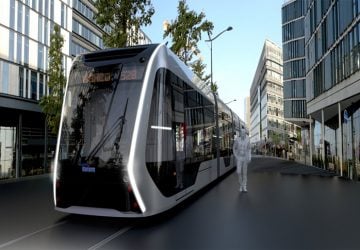Transportation Reimagined: Top 5 Revolutionary Green Solutions for a Sustainable Future
In confronting the dual threats of climate change and environmental decline, the realm of transport is progressing towards greener, more responsible models. Anticipated developments in this sector include lower carbon emissions, easing of traffic jams, and the enhancement of both the efficiency and reach of travel options.

Electric Vehicles (Keyword: Green Mobility):
Electric vehicles are surging in popularity, noted for their environmentally-friendly departure from conventional, fossil-fuel-reliant automobiles. Emitting no pollutants directly from their exhausts, they significantly cut down on both smog and the input to global warming. Battery improvements have not only stretched their driving range but also streamlined their recharging process, positioning them as a viable, green alternative for daily commutes.
Autonomous and Shared Mobility (Keyword: Efficiency Innovation):
Combining self-driving automobiles and collective transport services is poised to renovate the transportation landscape. Self-navigating vehicles stand to enhance traffic flow, minimize collisions, and cut back on congestion via strategic route selection. Meanwhile, shared mobility solutions, such as ride-sharing and car-sharing programs, encourage the efficient use of resources and lead to fewer cars crowding the streets.
High-Speed Rail and Hyperloop (Keyword: Rapid Transit):
Rail systems that are both swift and sustainable are emerging as favorable substitutes for airline travel over moderate distances. High-speed trains shrink travel durations, curb emissions, and bolster links among metropolitan hubs. Similarly, the visionary Hyperloop offers lightning-fast speed in low-pressure conduits, suggesting a near-supersonic yet eco-conscious mode of transportation.
Sustainable Aviation (Keyword: Eco-Aviation):
The flight sector is also taking strides towards greener operation. Exploration into electric and hybrid-electric planes, coupled with sustainable aviation fuels, strives to mitigate the ecological footprint of flying. Progress in both plane design and propulsion technology is pushing for more fuel-efficient, less polluting aircraft.
Active Transportation and Infrastructure (Keyword: Clean Commuting):
Encouraging physical means of travel such as pedaling and walking confers not only emissions reductions but also benefits to collective well-being and city living conditions. Urban planners are laying out more pathways friendly to pedestrians, bike lanes, and car-affordable areas to foster a switch to muscle-powered transit options. Furthermore, electric scooters and bikes are becoming favored tools for short, eco-conscious journeys.
In an era prioritizing ecological preservation, transportation is veering towards options that are sustainable, efficient, and considerate of the planet. The rise of electric vehicles, together with the evolution in autonomous and communal travel, rail and aviation enhancements, and the support for human-powered travel, serve as the foundation of this eco-conscious movement. As these forward-thinking measures grow and merge into the fabric of our transport networks, their influence stands to redefine our mobility, lessen our environmental impact, and cultivate a more connected and enduringly habitable earth. Adopting these green measures is crucial, not merely for the planet's sake but for nurturing thriving and healthful human habitats for the future.









